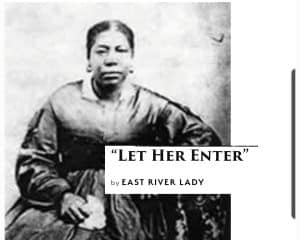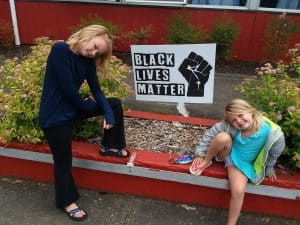 On Tuesday, October 27, President Oaks gave a devotional at Brigham Young University where, as the title of his talk suggests, he addressed “Racism and Other Challenges.” Members of the Church and the broader BYU community erupted on Twitter, many sharing with glee that he said the words, “Of course Black Lives Matter! That is an eternal truth all reasonable people should support.” However, in the next sentence, he shifted to argue that the banner of Black Lives Matter “was sometimes used or understood to stand for other things that do not command universal support.” While he made or quoted several statements about the need to abandon prejudice and repent individually of racism, he seems to denounce all recent forms of advocacy intended to address structural racism.
On Tuesday, October 27, President Oaks gave a devotional at Brigham Young University where, as the title of his talk suggests, he addressed “Racism and Other Challenges.” Members of the Church and the broader BYU community erupted on Twitter, many sharing with glee that he said the words, “Of course Black Lives Matter! That is an eternal truth all reasonable people should support.” However, in the next sentence, he shifted to argue that the banner of Black Lives Matter “was sometimes used or understood to stand for other things that do not command universal support.” While he made or quoted several statements about the need to abandon prejudice and repent individually of racism, he seems to denounce all recent forms of advocacy intended to address structural racism.
My concern is that in the framework Oaks lays out for not “quarrelling” with historical or scriptural racism, he discourages his primarily white audience from meaningful engagement with racial history that they can use to understand and respond to the current moment. As a white woman, I make no attempt to say how Black members of the Church should feel about or respond to Oaks’ words. My concern, however, is that white American members will use his words to excuse their need to act in solidarity with their Black brothers and sisters.
Ironically, Oaks takes a quote from a 1940 Winston Churchill speech intended to call for acting in unity and applies it to excusing racist actions and policies of past government and religious figures. Churchill, who has his own complicated history of racism and human rights violations, was tasked as the British Prime Minister in leading a coalition government in the war against Nazi Germany. When Churchill said, “If we open a quarrel between the past and the present, we shall find we have lost the future,” he was not discussing the role of studying and learning from history. Rather, he was talking about recent ideological differences with political opponents who were still in his government and with whom he needed to be able to act in unity in order to fight the war.
Oaks is unwilling to identify racism in the Bible as racism out of fear of “opening a quarrel.” Oaks offers a brief overview of several instances of racism in the Bible and says, “we can be troubled and misled by Bible-recorded scriptural directions or traditions that may be viewed as racist or discriminatory by modern definitions.” He dismisses this interpretation. Instead of aiding us in identifying and learning from racism in the scriptures, he declares that “God, who is the loving Father of all nations, tribes, and ethnicities, cannot be branded as racist for His dealings with His children.” This is an insufficient exegesis in part because it sets up a false binary that either God is racist or God is not racist, and because God is not racist we cannot evaluate these scriptures as demonstrating racism.
There is, fortunately, another option: people in the scriptures held racist ideas and enacted racist policies. Even covenant people of God made decisions that hurt their fellow children of God based on racial prejudice.
Perhaps concerned that identifying and denouncing racism in the scriptures will lead to more members identifying and denouncing the long history of racist attitudes and policies in the Church, Oaks doubles down on Churchill’s quote. He says, “Those who cannot accept the prophetic decisions and practices of the past should consider Winston Churchill’s wise counsel quoted earlier: ‘If we open a quarrel between the past and present, we shall find that we have lost the future.’” The Church is not facing the existential threat of WWII. By identifying racism in the Church’s history and present, we have the ability to root out racism and attempt to heal the wounds. Rather than lose the future, we can enter it with greater unity.
It’s possible that Oaks’ fear of clearly identifying and analyzing racism in the Bible and in the practices of past Church prophets is rooted in the fear of losing the practical belief of prophetic infallibility. Infallibility is not an official doctrine of the Church, but the oft repeated claim that “the Lord will never permit the prophet to lead the church astray” creates a functional belief in infallibility. When we cling to ideas of infallibility, studying honest history becomes dangerous. In history, we can see times when Church leaders acted in ways or instituted policies that hurt people. We can see when these men acted outside of our understanding of God’s nature.
If the prophet established a policy in the Church that was racist, but we believe that God is not racist, what does that mean about the prophet’s role as a spokesman for God? It becomes very tenuous, but only if we cling to the idea of prophetic infallibility tighter than we cling to Jesus Christ. We cannot allow fear to stop us individually and collectively, in our homes and in our institutions, from repenting from our racist ideas and policies.
If we want to apply Churchill’s quote to today, perhaps Oaks can call upon members to set aside their political divisions and unite in following our Black brothers and sisters in the actions necessary to make Black Lives Matter a legal, social, and religious reality. Individual feelings of love are important, but insufficient. Racism is not merely personal, it is structural. It will require united action to change laws, policies, and practices that create or exacerbate racial inequality. It will not be comfortable for white members who benefit from the racist inequalities in America today. It needs to be done anyway.
I’m glad that Church leaders are beginning to speak about racial inequality more frequently and directly. I agree with President Oaks that we must “unite in love for each other and of our Savior Jesus Christ.” However, actually achieving racial equality will require us to be willing to look at scripture and history and use terms that fit what we find. We must then abandon racism in our own hearts and minds and in our institutional policies and practices that lead to racial inequity.
Katie Rich has a BA in history and a MA in English literature, both from BYU. She is a mom of four kids and lives in Utah County. After several years as a stay at home mom, she is dipping her toes back into academia and enjoys researching topics related to Mormon women’s history.







13 Responses
Excellent
Thank you!
This is such an excellent post. I absolutely agree with you about the utter inadequacy (to put it kindly) of Oaks’ discussion of racism in the scriptures. I feel like Oaks just walked back the progress the church has been making over the last decade when it comes to discourse on race and racism. The gospel topics essay on race strongly implied that the priesthood ban was a product of its racist time and place. That, in my opinion, is the right direction to go in terms of rhetoric on race and Mormonism. Here Oaks seemed to justify the priesthood pan as coming from God, which is unacceptable. That said, I am glad he said black lives matter. That’s important. Too bad he then had to undercut the power of that statement.
Thank you for your post, Katie. This issue deserves attention. You articulated very clearly how Oaks spoke out of both sides of his mouth on this issue. I agree that it is a good thing that he spoke the words, “Black lives matter,” but his approach on this issue was contradictory at best. The church has a long way to go in righting the wrongs of its racist history and the ways in which it upholds white supremacy.
History is what really happened, not what we wish had happened. When we write history, we too often engage in the wish, not the reality.
Thank you for your brave and wise words.
thank you for this. completely agree
[…] rooted in the fear of losing the practical belief of prophetic infallibility,” Rich writes in an Exponent II blog post. “Infallibility is not an official doctrine of the church, but the oft repeated claim that ‘the […]
I was thinking about this, and it occurred to me to compare the Churchill quote to another, common statement (Wikiquotes attributes it to George Santayana), “Those who cannot remember the past are condemned to repeat it.” It seems that much of the time when these questions around the priesthood and temple ban come up, it is in the context of other controversial issues (LGBT issues or women and priesthood issues). The concern that I see expressed in this questioning is, if we do not come to some understanding of what happened in the 19th and early 20th century in the church to implement and perpetuate the priesthood and temple ban, then we will end up repeating any of the mistakes that were part of that in future issues (like LGBT issues).
Just because Elder Oaks didn’t say words that you wanted him to say does not mean that he’s afraid to do it. Do you know him personally? Do you have evidence he’s afraid to say things other than the fact that you think he should say them and he didn’t? It seems a far stretch to be subscribing thoughts and intentions to a man you likely don’t know and to things he did not say. Dallin H. Oaks is a very intelligent, forward-thinking man.
Often times social justice warriors conclude that their prescribed path to accomplishing their goals for society is the only means to move forward and achieve justice. They think that people who disagree with them, or who may even agree but take a different approach to solving problems, are inherently wrong because it’s not what they would do. Are you acknowledging the potential fallability of your thought processes, just as you’re asking others to acknowledge the fallability of their church leaders?
Mrs. M., Katie offered a well-thought critique and deconstruction of a few of the ideas President Oaks presented to help us all in our anti-racist work. It feels like you are ascribing a vitriolic intent to her words where I don’t see any intended.
I think your point about the false binary is a good one — it isn’t a question of whether or not God is racist — self-evidently God is not racist. If we move from the assumption that God is never racist, then it is easier to read scriptures with a critical eye without denying God.
God is not racist; people are racist. And people are not God. Thank you for this thoughtful analysis.
Many conservative LDS people consider BLM to be a violent racist hate group. You will never bridge that gap. The saying is true but the politics are simply beyond the pale.